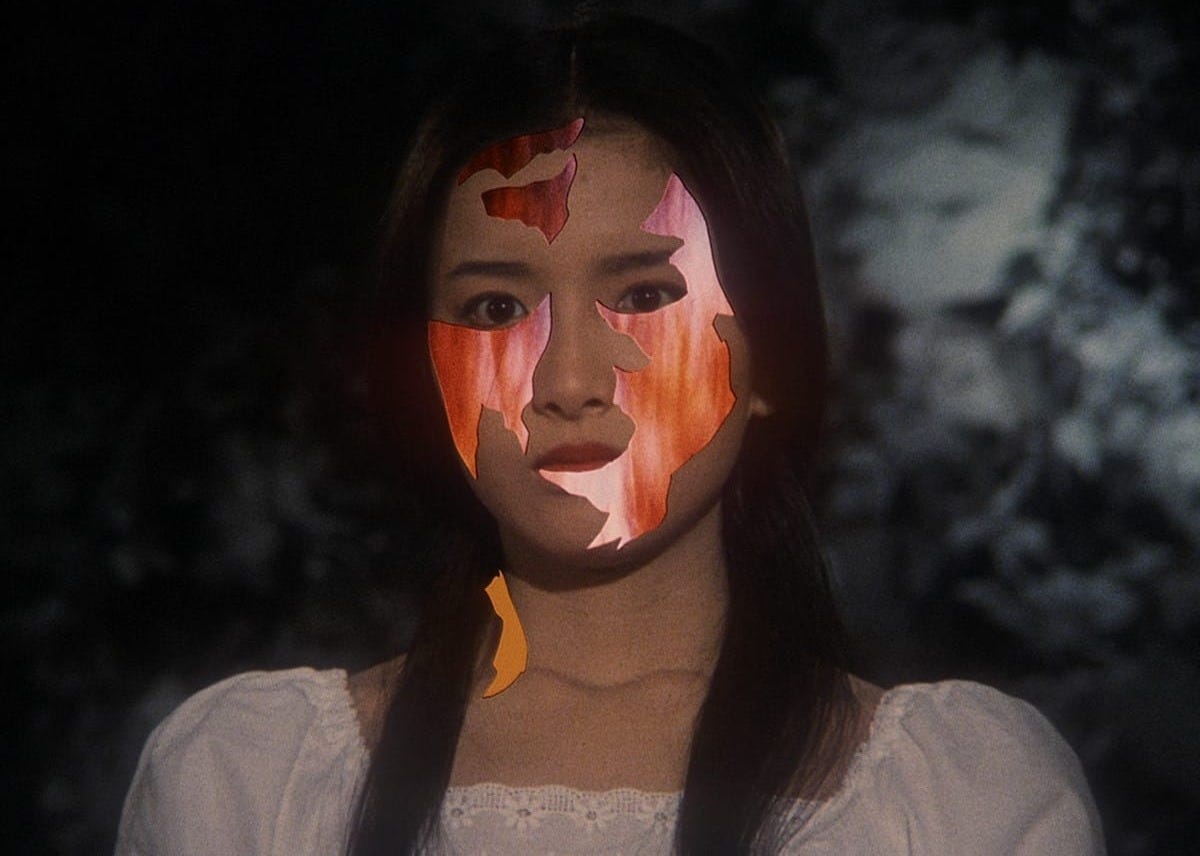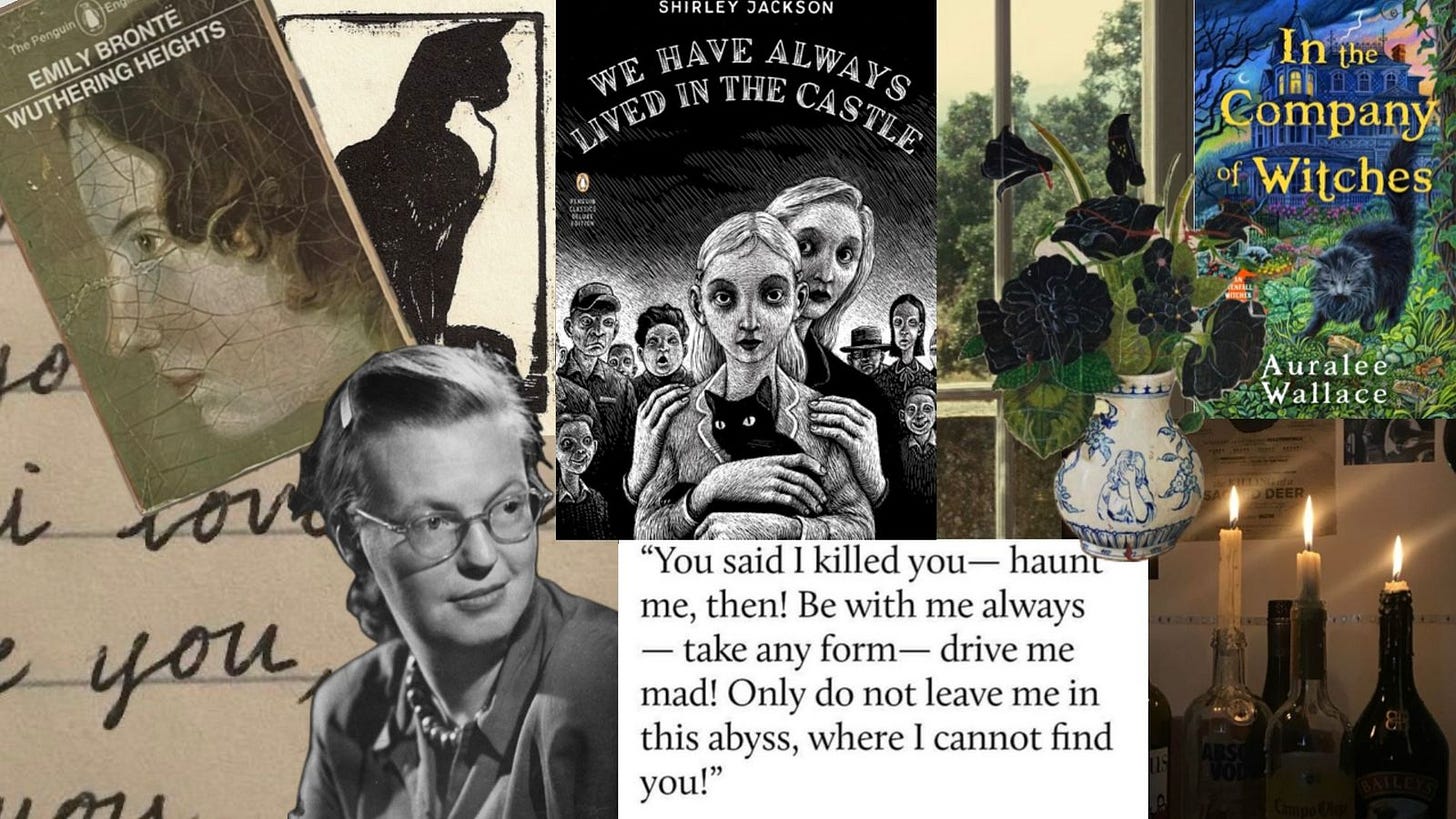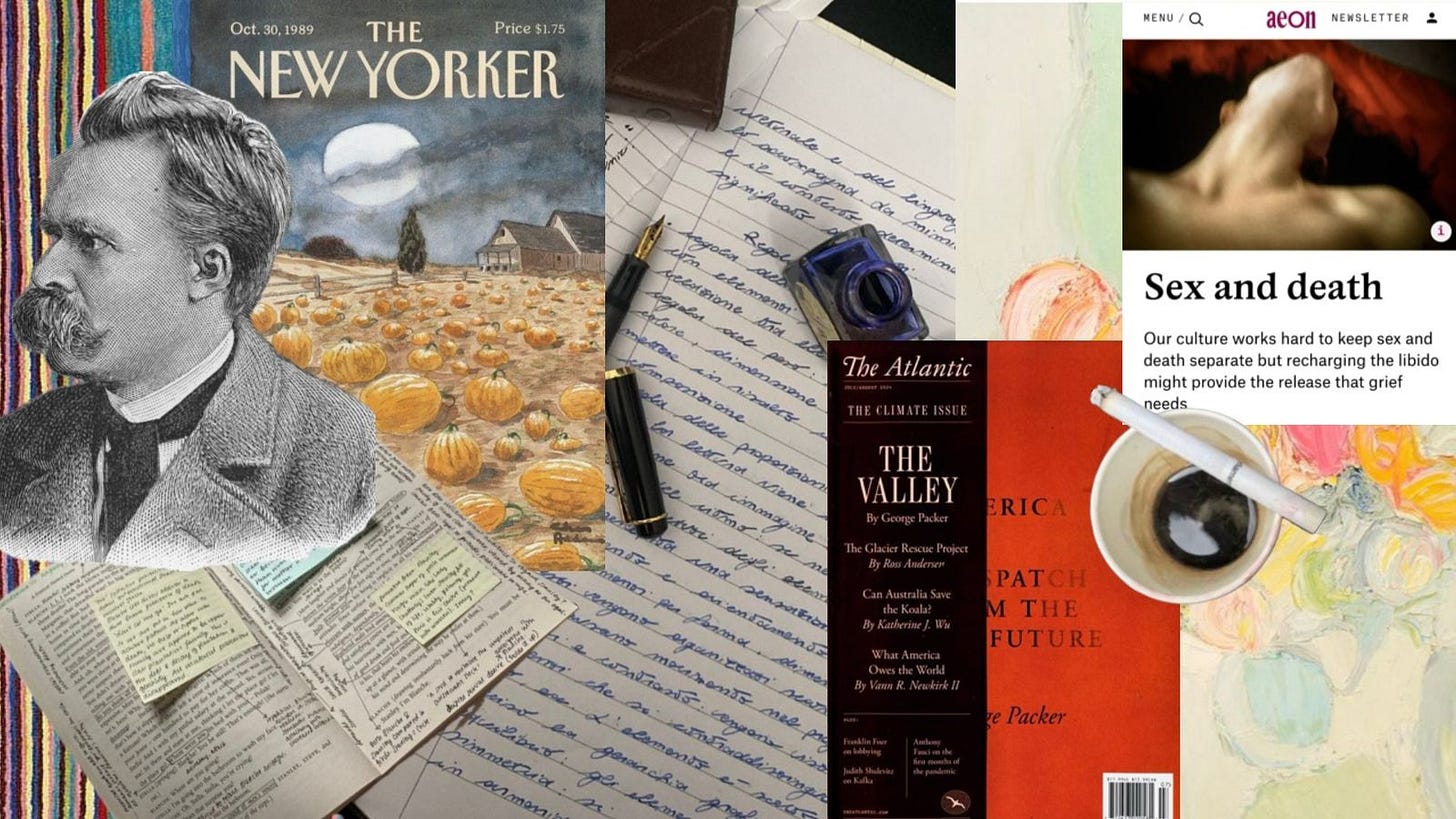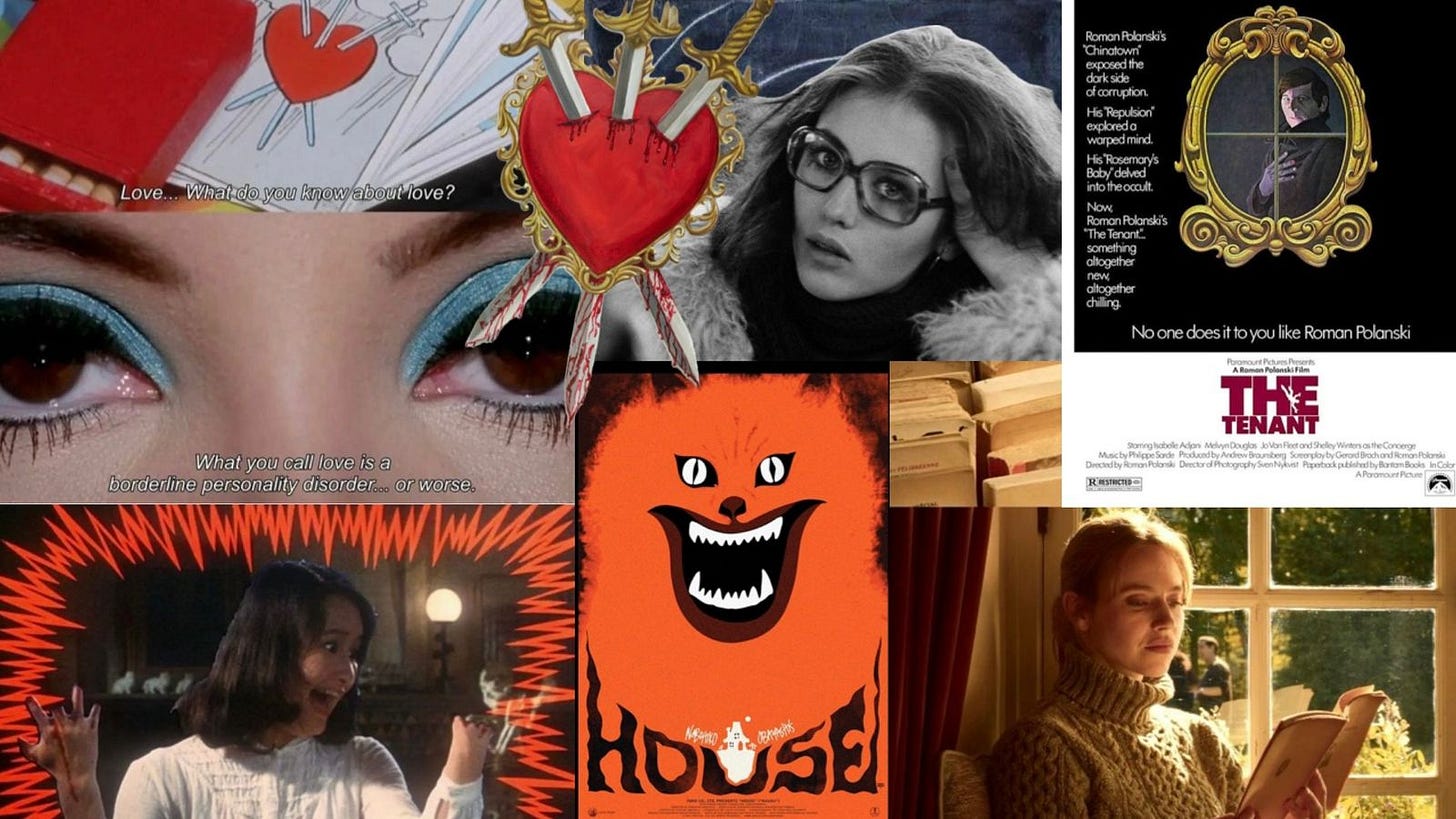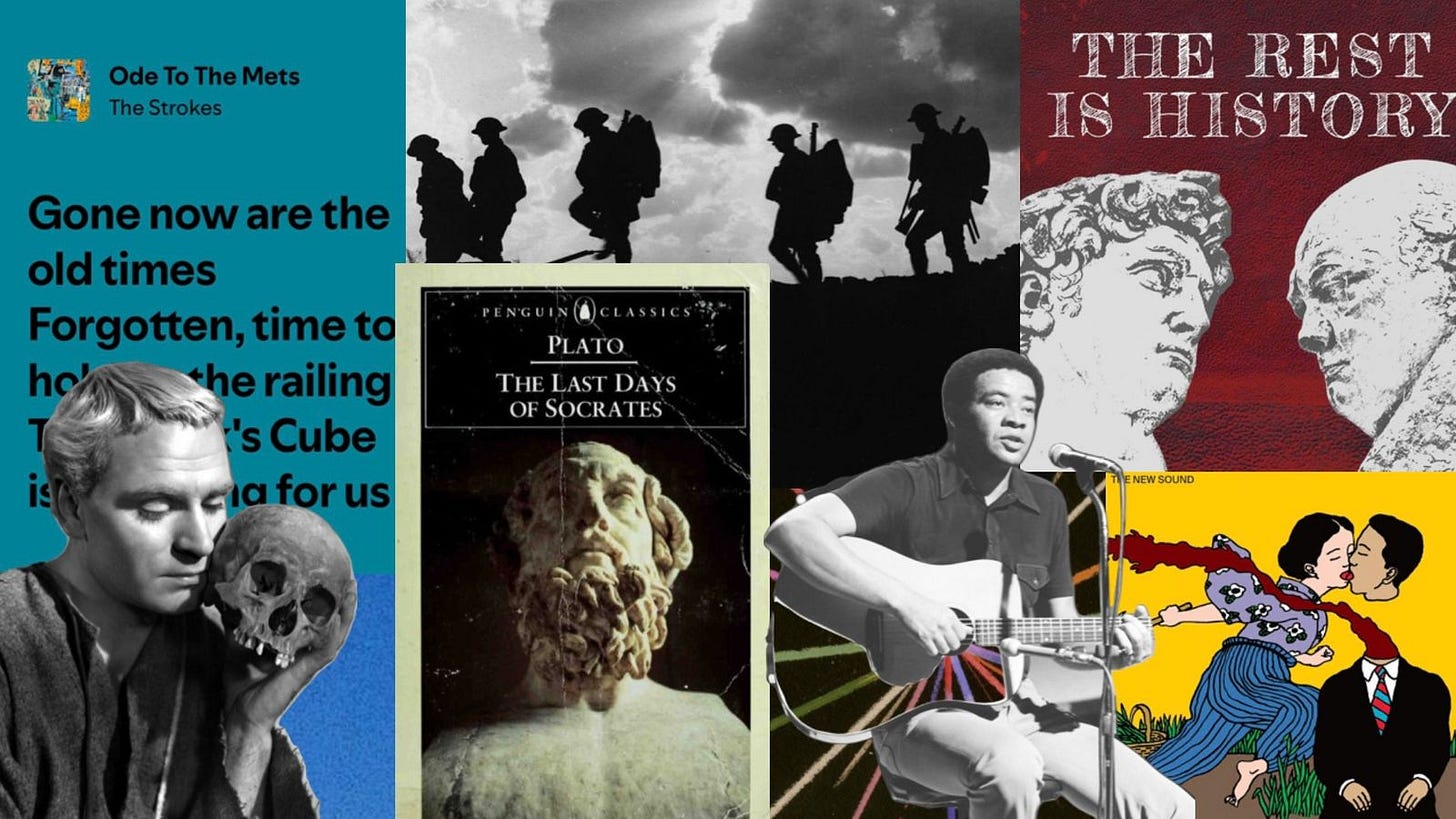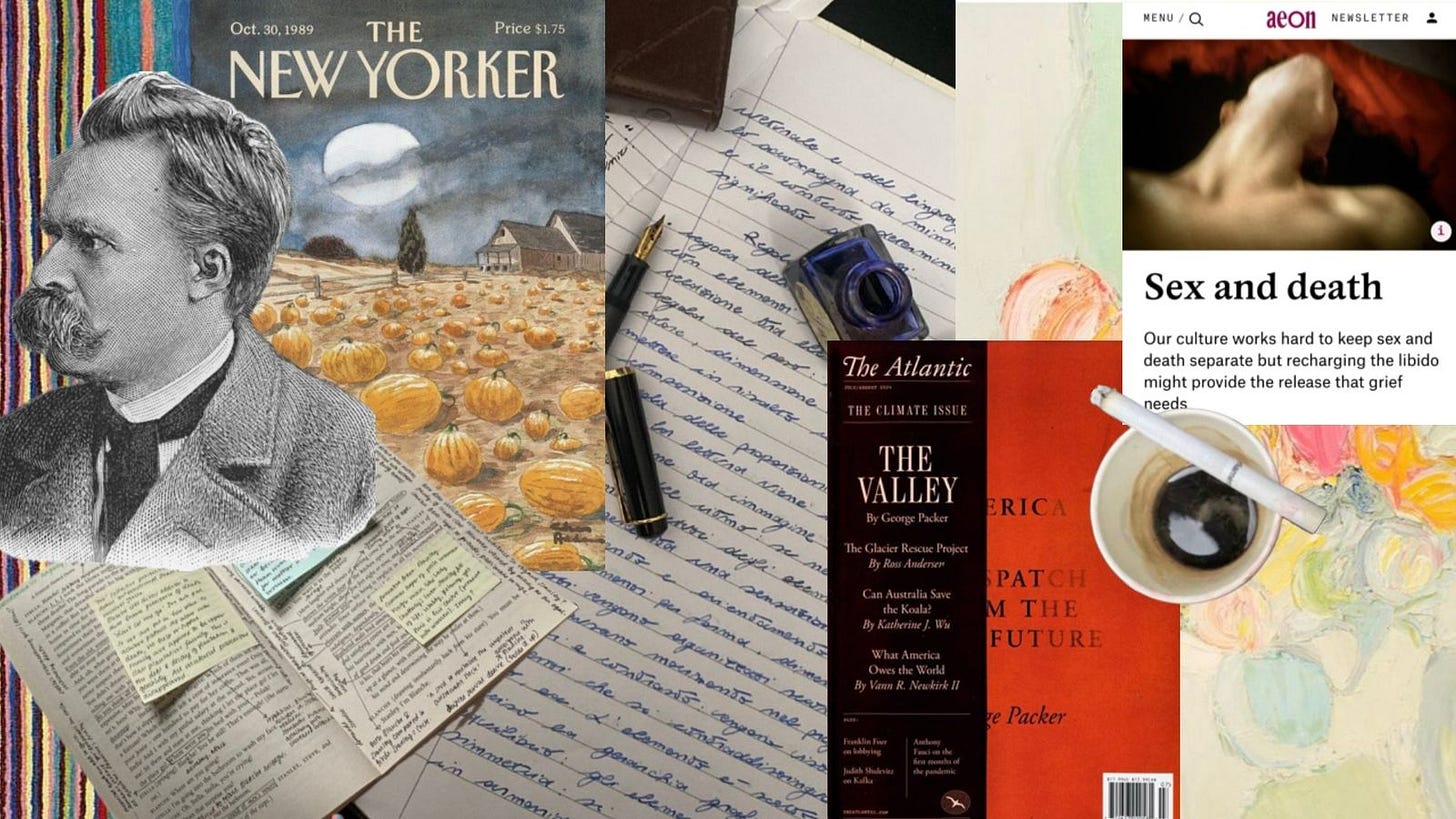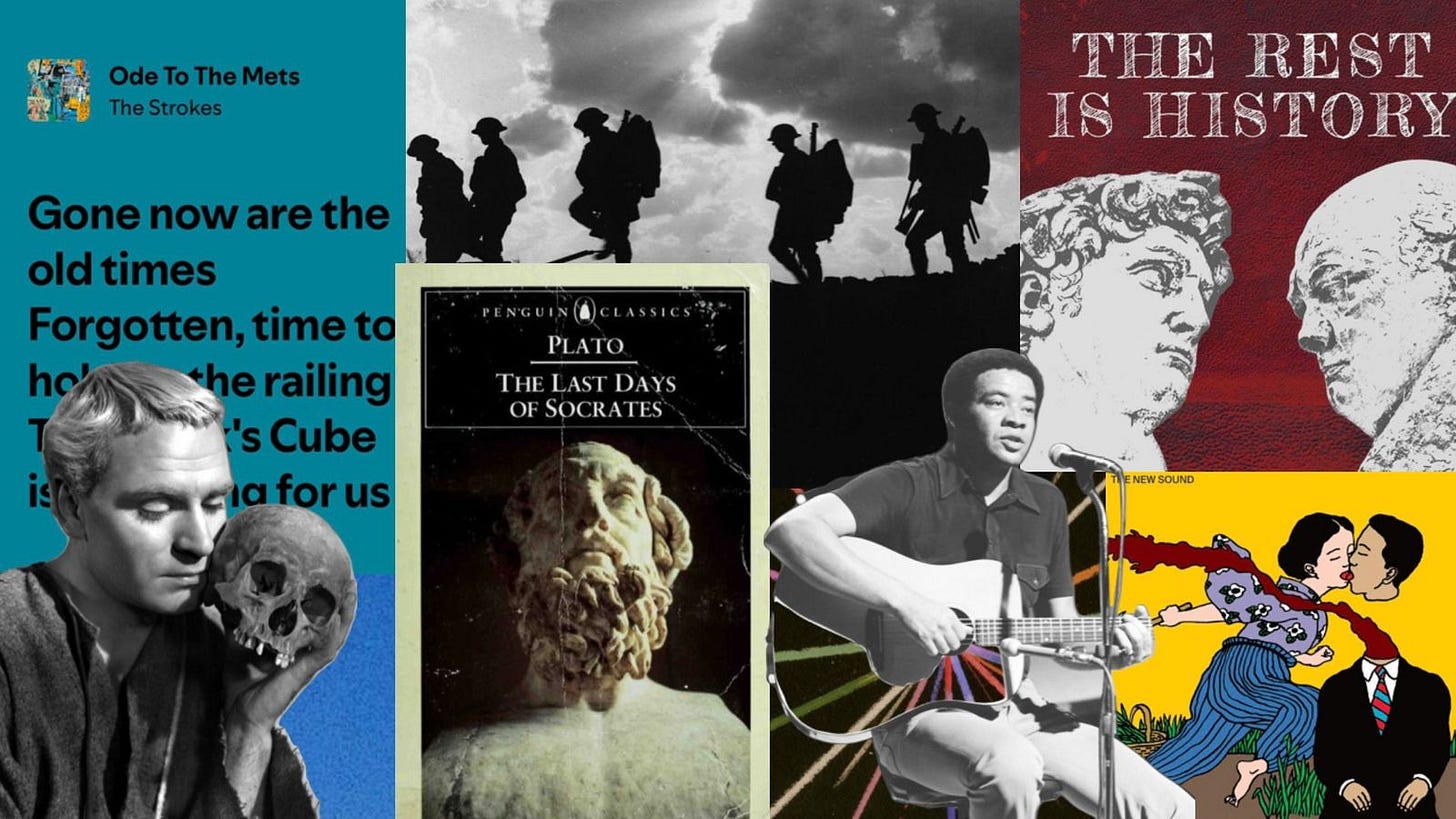Methought - October/2024
Monthly wrap-up: Japanese horror classics, three different witches in small towns, rereading Wuthering Heights, Hamlet and Socrates on death, and disappointing essays on sex and relationsips.
scroll down to read the English version
Caros Leitores,
Por algum motivo cósmico, Outubro é sempre um ótimo mês. Li e assisti várias coisas temáticas de Halloween (como sempre) e passei por uma montanha russa de emções relendo Wuthering Heights junto com minha irmã, que leu pela primeira vez — evento canônico. Tinha esquecido quão trágico é esse romance, até comecei a escrever sobre mas não concluí (me perdoem às vezes a vida não deixa a gente escrever).
O poema do mês tinha que ser esse clássico do meu querido Dylan Thomas, e se puderem procurem gravações dele mesmo recitando — não tem nada igual.



LIVROS &TC
We Have Always Lived in the Castle - Shirley Jackson (1962)
Primeiro romance que leio de Shirley Jackson e foi uma experiência terrivelmente desconfortável e levemente decepcionante. Desconfortável pois o horror, para mim, não tem nada a ver com casas mal assombradas, possíveis fantasmas ou assassinatos, mas com o tratamento abominável que as irmãs Blackwood recebem das pessoas em volta delas, principalmente dos homens. Poucas vezes odiei tanto um personagem quanto odiei Charles (imagino que o marido de Sylvia Plath, que não merece ser nomeado, era assim), e a cena da pilhagem da casa foi extremamente difícil de ler.
Decepcionante pois achei a escrita de Jackson um tanto empobrecida. Sei que estavamos lendo através da narração de Merricat e que, tendo isso em mente, a narração é coerente com a personagem. Entretanto, a repetição de “I thought/wished them dead” e a sucessão de frases descrevendo ações (“I went to the woods and I buried this and I went back to the kitchen and I talked to the cat…”) me cansou um pouco, e olhe que é um livro bastante curto. Infelizmente eu deduzi o “mistério” rápido e não pude apreciar o choque de uma revelação. Ainda assim, é um livro que prende a atenção (li em dois dias) e tenho vontade de ler mais da autora.
In the Company of Witches - Auralee Wallace (2021)
Li esse livro só para me distrair e entrar no clima do Halloween, e só depois eu percebi que ele é bastante inspirado no We Have Always Lived in the Castle — duas irmãs bruxas (uma inclusive se chama Constance), uma conectada à natureza e a outra uma grande cozinheira (que nem a Constance de Jackson), um tio recluso, e um vilarejo que as odeia. A diferença é que esse livro é uma comédia romântica estilo Gilmore Girls e Practical Magic. Superou minhas expectativas pois me diverti bastante lendo, é bem escrito para o que se propõe a ser, e os personagens são convicentes além de queridos (não são os estereótipos que eu estava esperando). Recomendo pra quem quer uma leitura boba, no bom sentido.
Wuthering Heights - Emily Brontë (1847)
Essa foi a primeira vez que reli Wuthering Heights, um dos meus livros favoritos, e simultaneamente tive uma experiência idêntica e totalmente diferente. Chorei muito e pelas mesmas cenas tal qual da primeira vez, mas tive uma percepção nova dos personagens, principalmente de Heathcliff: não consegui ter a mesma empatia que tive por ele antes, e hoje estou do lado das pessoas que dizem que este livro não é um história de amor, por mais que pareça às vezes.
Existe uma curiosa linha tênue entre expressões absurdamente intensas de violência e amor em WH, mas de tal forma que, até então, nunca encontrei em outras obras. Muito me espanta que alguém como Emily Brontë, sendo quem era, escreveu um livro desses. Tudo em WH é brutal, cruel, absoluto, categórico, excessivo. Os ciclos amaldiçoados parecem inescapáveis principalmente porque, numa aparente ausência de Deus, alguém tomou este lugar de controle e quis que o ciclo se perpetuasse assim, e este alguém é Heathcliff — que para mim é uma entidade tão interessante e complexa quanto Hamlet ou Juiz de Meridiano de Sangue.
ARTIGOS & ENSAIOS
The People Who Quit Dating - Faith Hill for The Atlantic (2024)
Essa matéria me deixou um tanto confusa e irritada. Não entendo — e tampouco simpatizo com — a necessidade quase desesperada que tanta gente tem estar sempre buscando relacionamentos amorosos. Nunca tive um relacionamento sério e quando digo a alguém que não sinto falta de um normalmente reagem com ceticismo, como se isso fosse impensável. Achei que o texto fosse ter um tom mais otimista sobre a libertação da aceitação de uma vida solteira, mas na verdade a autora trata isso como um luto, uma espécie de vale das sombras que só é possível sair fazendo grandes concessões. Acho a cultura de apps de encontro patética, e as pessoas precisam reaprender a interagir no mundo fazendo amizades primeiro, naturalmente. A visão desse texto é distintamente millenial e meio triste, e fiquei me perguntando se os entrevistados não tinham nenhum hobby.
Nietzsche’s Eternal Return - Alex Ross for The New Yorker (2019)
To the opponents of democracy, Nietzsche says, in essence: Just wait. Liberal democracy will devour itself, creating conditions for authoritarian rule. Disorder and instability will sow distrust in politics itself. “Step by step, private companies will absorb the functions of the state,” Nietzsche writes. “Even the most tenacious remnants of the old work of governing (the activity, for example, that is supposed to protect private persons from one another) will finally be taken care of by private entrepreneurs.” The distinction between public and private spheres will disappear. The state will give way to the “liberation of the private person (I take care not to say: of the individual).”
And here we are, in the twenty-first-century world of laissez-faire economics and unregulated Big Tech monopolies.
Já li outros textos de Alex Ross para o TNY e gosto bastante do trabalho dele. Nesse ensaio, ele analisa as multitudes da filosofia de Nietzsche através das décadas e das diversas escolas de pensamento que de alguma forma foram influenciadas pelo pensador alemão. Ross cita uma frase do tradutor Walter Kaufmann sobre os livros de Nietzsche: “it’s easier to read but harder to understand than those of almost any other thinker.” Tendo lido dois livros e alguns ensaios dele, eu tenho que concordar. A escrita de Nietzsche é bastante clara mesmo com contradições, e o difícil é perceber a complexidade de suas ideias por trás da linguagem simples. O texto também aborda as conexões perigosas (e muitas vezes equivocadas) entre Nietzsche e políticas alt-right; como vemos no trecho acima, Nietzsche tinha bons insights e pelo que li até então, a associação dele com pautas incel é meio injusta.
Sex and Death - Cody Delistraty for Aeon Magazine (2024)
Heightened sexual situations provide catharsis, Meyer explained, letting us say the things we might feel deeply but are anxious to discuss, a smashing together of Eros and Thanatos. ‘At states of orgasm, the boundaries between us and the world dissolve, and we can really feel elevated beyond the heaviness of the pain,’ she told me. ‘At higher states of arousal, the threshold of what you can tolerate increases because of endorphins and dopamine … Things like disgust, fear, sadness, we can hold that a lot more easily.’ That is, we can look straight-on at what we might normally try to sweep aside or forget entirely.
Ensaio bem interessante, porém mais clínico do que filosófico para meu gosto, sobre como o sexo pode ser um “instrumento” para lidar com o luto. Delistraty investiga a relação biológica entre sexo e morte, não de forma cultural mas no indivíduo. Gostei da menção à Egon Schiele, um artista bem esquisito (e segundo esse texto controverso) que adoro.
FILMES & SÉRIES
Nobody Wants This - Erin Foster (2024)
Raramente assisto séries de comédia romântica para passar o tempo justamente porque nunca tenho tempo. Porém, teve um dia que eu estava chateada e precisava me animar, então decidi maratonar essa série inteira de uma vez. Foi uma ótima surpresa pois, apesar dos clichês (o clássico mal entendido), a série consegue ser relativamente inovadora ao trazer personagens na casa dos 30, um rabino e uma podcaster, que são parcialmente bem resolvidos e abertos na comunicação. O desenvolvimento do relacionamento é plausível sem abrir mão do romantismo (superação de obstáculos a princípio intransponíveis). Ótimas piadas e personagens secundários, vale assistir.
The Love Witch - Anna Biller (2016)
Eu sempre soube que ia amar esse filme e eu estava certa. Quando descobri que a diretora de The Love Witch é a mesma autora que escreveu Bluebeard’s Castle, livro que fez sucesso no meu nicho literário online, tudo fez sentido. Tendo uma bruxa obcecada por romance e sexo como protagonista, o filme gira em torno de uma performance feminina tradicional porém “perigosa” ou “obscura” (aquilo que o TikTok chama — embaraçosamente — de Dark Femininity) e tem uma estética fabulosa: Filmado em 35mm e usando cortador negativo original, ele presta um tributo preciso aos filmes de terror e Technicolor dos anos 1960. Além disso, o figurino meio teatral também remete à essa época do cinema, que por acaso é minha favorita. Fiquei muito impressionada ao descobrir que a Anna Biller foi responsável pelo roteiro, direção, edição, produção, trilha sonora e design dos figurinos e do set. Parece mentira mas dá para notar que esse filme é um grande passion project.
Coup de Chance - Woody Allen (2023)
Não é segredo para ninguém que gosto bastante dos filmes de Allen, e eu estava curiosa para seu primeiro filme em francês (não tinha jeito, afinal nenhuma produtora americana quer financiar ele hoje em dia), mas como esperado de seus últimos filmes: ele entregou mais do mesmo. Coup de Chance é divertido, mas não chega nem perto do texto espirituoso e sarcástico do Allen da década de 80, e os visuais bonitos de Paris perderam um pouco o encanto devido a uma escolha estranha de saturar ao máximo as cores do filme. A história é mais uma materialização da eterna obsessão de Allen com a sorte, o acaso e os desencontros, mas é muito mais fraco do que os maravilhosos Match Point e Crimes and Misdemeanors. Acho que ele devia se aposentar de vez.
House - Nobuhiko Obayashi (1977)
Posso dizer com tranquilidade que esse é o filme mais absurdo e esquisito que já vi, mas é sensacional. Essa é a história de sete meninas que representam vários estereótipos (elas se chamam Fancy, Prof, Melody etc.), indo passar as férias de verão na casa da tia idosa de uma delas, que logo se revela uma espécie de bruxa, e as meninas são consumidas pela bruxa e pela casa de formas inacreditáveis, uma a uma. A edição e a fotografia de House são uma absurdez que vale ser analisada a parte: a sobreposição propositalmente tosca de imagens, a câmera instável e os efeitos especiais primitivos sustentam a narrativa de horror desse dark-fairytale, e o filme não seria a mesma coisa se fosse “bem feito”.
The Tenant - Roman Polanski (1976)
Se Janela Indiscreta tivesse sido escrito por Dostoiévski, o resultado seria esse filme. Apesar dessa grande descrição, The Tennant ainda é meio decepcionante. Tem elementos de folk horror, pois a narrativa consiste num grupo de vizinhos de um prédio decadente em Paris (a comunidade) infernizando a vida de um novo inquilino (o outsider) até ele enlouquecer completamente. Achei que a atuação de Isabelle Adjani foi o grande destaque do filme, e não gostei de Polanski como o protagonista. Tem momentos muito bons e muito ruins no filme, os melhores sendo os delírios febris (que me lembraram Dostoiévski) do inquilino perseguido. A intenção era ver um filme de terror lado-B pro Halloween, mas eu deveria ter me contentado com O Bebê de Rosemary.
MÚSICA & PODCASTS
Série sobre a 1ª Guerra Mundial - The Rest is History Podcast
Já recomendei esse podcast várias vezes e acho que posso dizer que é meu favorito. Tom e Dominic são uma dupla incrível, e essa série de 10 episódios que vai do assassinato do Arquiduque Franz Ferdinand à derrota do Kaiser é super completa e divertida. Já tive essa discussão antes: em termos puramente acadêmicos e históricos, a 1ª Guerra é bem mais interessante que a 2ª.
Hamlet and Socrates and Death - Classical Stuff You Should Know
Outro podcast que já recomendei bastante, o tema desse episódio parece que foi feito pensando em mim. A.J., Graeme e Thomas discutem os conceitos divergentes (e quase opostos) que Hamlet e Sócrates tem sobre a morte e sua aceitação. Sócrates tem uma atitude de aceitação radical sobre a morte, e diz que não devemos temê-la nem encará-la como castigo pois não sabemos o que ela é, e seria desvirtuoso presumir o pior sem embasamento. Para Hamlet, é justamente essa impossibilidade de saber que o coloca em desespero: o desconhecido é mais assustador do que um mal conhecido. Me alinho bem mais com a perspectiva de Sócrates, mas sou completamente fascinada pelos medos e questionamentos de Hamlet.
The New Sound - Georgie Greep (2024)
Essa é a primeira vez em anos que eu escuto um som e penso “ok, isso é inédito”. Mas o diferencial desse álbum é a combinação excêntrica de dezenas de influências que são identificáveis. Greep combina vocais de musical com ritmos do samba, jazz, blues, rock (particularmente Frank Zappa) e até música cubana — e ainda assim, esse álbum poderia entrar dentro do guarda-chuva de brit-indie-rock. Recomendo ouvir ele inteiro do começo ao fim.
The New Abnormal - The Strokes (2020)
Adoro The Strokes mas fazia tempo que eu não escutava. Por algum motivo voltei a ficar obcecada por esse álbum — que, inclusive, foi meu álbum da pandemia — e lembrei como Julian Casablancas é um grande compositor. Ode to the Mets é uma das minhas músicas favoritas de todos os tempos.
‘Justments - Bill Withers (1974)
Talvez você, como eu até pouco tempo atrás, só conheça uma ou duas músicas de Bill Withers como “Ain’t No Sunshine” ou “Lovely Day”, e essa é oportunidade de mudar isso ouvindo esse álbum sensacional que descobri por acaso através da música “The Same Love That Made Me Laugh”. ‘Justments é uma maravilha para quem gosta de blues, eu poderia ouvir a voz de Withers todo dia…
Dear Readers,
For some cosmic reason, October is always a great month. I read and watched a lot of Halloween-themed stuff (as always) and went through a rollercoaster of emotions re-reading Wuthering Heights with my sister, who read it for the first time — canonic event. I'd forgotten how tragic this novel is, I even started writing about it but didn't finish (forgive me, sometimes life doesn't let us write).
The poem of the month had to be this classic by my beloved Dylan Thomas, and if you can, look for recordings of him reciting it - there's nothing like it.



BOOKS &TC
We Have Always Lived in the Castle - Shirley Jackson (1962)
The first novel I read by Shirley Jackson was a terribly uncomfortable and slightly disappointing experience. Uncomfortable because horror, for me, has nothing to do with haunted houses, possible ghosts or murders, but with the abominable treatment the Blackwood sisters receive from the people around them, especially the men. Few times have I hated a character as much as I hated Charles (I imagine Sylvia Plath's husband, who doesn't deserve to be named, was like that), and the scene of the looting of the house was extremely tough to read.
Disappointing because I found Jackson's writing rather lacklustre. I realise that we were reading through Merricat's narration and with that in mind, the narration is coherent with the character. However, the repetition of ‘I thought/wished them dead’ and the succession of sentences describing actions (‘I went to the woods and I buried this and I went back to the kitchen and I talked to the cat...’) bored me a little, and it's quite a short book. Unfortunately, I deduced the ‘mystery’ quickly and couldn't appreciate the shock of a revelation. Still, it's a gripping book (I read it in two days) and I'm keen to read more by the author.
In the Company of Witches - Auralee Wallace (2021)
I read this book just to entertain myself and get in the mood for Halloween, and it was only afterwards that I realised that it was very much inspired by We Have Always Lived in the Castle - two witchy sisters (one is even called Constance), one connected to nature and the other a great cook (like Jackson's Constance), a reclusive uncle, and a village that hates them. The difference is that this book is a romantic comedy in the style of Gilmore Girls and Practical Magic. It exceeded my expectations because I had a lot of fun reading it, it's well-written for what it sets out to be, and the characters are convincing as well as likable (they're not the stereotypes I was expecting). I recommend it to anyone who wants a silly read, in a good way.
Wuthering Heights - Emily Brontë (1847)
This was the first time I reread Wuthering Heights, one of my favourite books, and I had both an identical and a totally different experience. I cried a lot over the same scenes as the first time, but I had a new perception of the characters, especially Heathcliff: I couldn't empathise with him as I had before, and today I'm on the side of the people who say that this book is not a love story, no matter how much it may seem so at times.
There is a curiously fine line between absurdly intense expressions of violence and love in WH, but in a way that, until then, I had never encountered in other works. I'm amazed that someone like Emily Brontë, being who she was, wrote such a book. Everything in WH is brutal, cruel, absolute, categorical, excessive. The cursed cycles seem inescapable mainly because, in the apparent absence of God, someone has taken this place of control and wanted the cycle to perpetuate itself, and this someone is Heathcliff - who for me is as interesting and complex an entity as Hamlet or the Judge in Blood Meridian.
ARTICLES & ESSAYS
The People Who Quit Dating - Faith Hill for The Atlantic (2024)
This article has left me somewhat confused and irritated. I don't understand - nor do I sympathise with - the almost desperate need for so many people to always be looking for romantic relationships. I've never had a serious relationship and when I tell someone I don't miss one, they usually react with scepticism, as if it were unthinkable. I thought the piece was going to have a more optimistic tone about the liberation of accepting a single life, but in fact, the author treats it as a bereavement, a kind of valley of shadows that you can only get out of by making big concessions. I think the dating app culture is pathetic, and people need to relearn how to interact in the world by making friends first, in a natural way. The outlook of this essay is distinctly millennial and a little sad, and I wondered if the interviewees didn't have any hobbies.
Nietzsche’s Eternal Return - Alex Ross for The New Yorker (2019)
To the opponents of democracy, Nietzsche says, in essence: Just wait. Liberal democracy will devour itself, creating conditions for authoritarian rule. Disorder and instability will sow distrust in politics itself. “Step by step, private companies will absorb the functions of the state,” Nietzsche writes. “Even the most tenacious remnants of the old work of governing (the activity, for example, that is supposed to protect private persons from one another) will finally be taken care of by private entrepreneurs.” The distinction between public and private spheres will disappear. The state will give way to the “liberation of the private person (I take care not to say: of the individual).”
And here we are, in the twenty-first-century world of laissez-faire economics and unregulated Big Tech monopolies.
I've read other texts by Alex Ross for TNY and I really like his work. In this essay, he analyses the multitudes of Nietzsche's philosophy over the decades and the various schools of thought that have somehow been influenced by the German thinker. Ross quotes a phrase from translator Walter Kaufmann about Nietzsche's books: ‘it's easier to read but harder to understand than those of almost any other thinker.’ Having read two of his books and a few essays, I have to agree. Nietzsche's writing is very clear, even with contradictions, and the hard part is grasping the complexity of his ideas behind the simple language. The piece also addresses the dangerous (and often equivocal) connections between Nietzsche and alt-right politics; as we see in the extract above, Nietzsche had good insights and from what I've read so far, associating him with incel agendas is a bit unfair.
Sex and Death - Cody Delistraty for Aeon Magazine (2024)
Heightened sexual situations provide catharsis, Meyer explained, letting us say the things we might feel deeply but are anxious to discuss, a smashing together of Eros and Thanatos. ‘At states of orgasm, the boundaries between us and the world dissolve, and we can really feel elevated beyond the heaviness of the pain,’ she told me. ‘At higher states of arousal, the threshold of what you can tolerate increases because of endorphins and dopamine … Things like disgust, fear, sadness, we can hold that a lot more easily.’ That is, we can look straight-on at what we might normally try to sweep aside or forget entirely.
A very interesting essay, but more clinical than philosophical for my taste, on how sex can be a ‘tool’ for dealing with grief. Delistraty investigates the biological relationship between sex and death, not in a cultural way but in the individual. I liked the mention of Egon Schiele, a very strange artist (and controversial according to this piece) whom I adore.
FILMS & SERIES
Nobody Wants This - Erin Foster (2024)
I rarely watch romantic comedy series to pass the time, precisely because I never have the time. However, one day I was upset and needed cheering up, so I decided to marathon this entire series in one go. It was a great surprise because, despite the clichés (the classic misunderstanding), the series manages to be relatively innovative by bringing together characters in their late 30s, a rabbi and a podcaster, who are partly well-resolved and open in their communication. The development of the relationship is plausible without giving up romanticism (overcoming obstacles that were at first insurmountable). Great jokes and secondary characters, well worth watching.
The Love Witch - Anna Biller (2016)
I always knew I would love this film and I was right. It all made sense when I discovered that the director of The Love Witch was the same author who wrote Bluebeard's Castle, a book that was a hit in my online literary niche. With a witch obsessed with romance and sex as its protagonist, the film revolves around a traditional but ‘dangerous’ or ‘dark’ female performance (what TikTok calls - embarrassingly - Dark Femininity) and has a fabulous aesthetic: Shot on 35mm, it’s very accurate in its imitation of Technicolor films of the 1960s. In addition, the somewhat theatrical costumes are also reminiscent of that era of cinema, which happens to be my favourite. I was super impressed to discover that Anna Biller was responsible for the script, direction, editing, production, soundtrack and costume and set design. It sounds like she’s making it up, but you can tell that this film is one big passion project.
Coup de Chance - Woody Allen (2023)
It's no secret that I quite like Allen's films, and I was curious about his first film in French ( after all, no American production company wants to finance him these days), but as expected from his latest films: he delivered more of the same. Coup de Chance is entertaining, but it doesn't come close to Allen's witty and sarcastic writing from the 1980s, and the beautiful visuals of Paris have lost a little of their charm due to an odd choice to saturate the film's colours as much as possible. The story is yet another materialisation of Allen's eternal obsession with luck, coincidence and mismatches, but it's much weaker than the wonderful Match Point and Crimes and Misdemeanors. I think he should retire for good.
House - Nobuhiko Obayashi (1977)
I can easily say that this is the most absurd and weird film I've ever seen, but it's terrific. This is the story of seven girls who represent various stereotypes (they're called Fancy, Prof, Melody etc.), going to spend the summer holidays at the house of the elderly aunt of one of them, who soon turns out to be some kind of witch, and the girls are consumed by the witch and the house in unbelievable ways, one by one. House's editing and photography are an absurdity worth analysing separately: the deliberately crude superimposition of images, the unstable camera and the primitive special effects sustain the horror narrative of this dark-fairytale, and the film wouldn't be the same if it were ‘well made’.
The Tenant - Roman Polanski (1976)
If Rear Window had been written by Dostoevsky, the result would be this film. Despite this great description, The Tennant is still a bit of a disappointment. It has elements of folk horror, as the narrative consists of a group of neighbours in a decaying building in Paris (the community) making life hell for a new tenant (the outsider) until he goes completely mad. I found Isabelle Adjani's performance to be the highlight of the film, and I didn't like Polanski as the protagonist. There are very good and very bad moments in the film, the best being the feverish delusions (which reminded me of Dostoevsky) of the persecuted tenant. I intended to see a B-side horror film for Halloween, but I should have settled for Rosemary's Baby.
MUSIC & PODCASTS
Series on World War I - The Rest is History Podcast
I've recommended this podcast several times and I think I can say it's my favourite. Tom and Dominic are an incredible duo, and this 10-episode series from the assassination of Archduke Franz Ferdinand to the defeat of the Kaiser is super thorough and entertaining. I've had this argument before: in purely academic and historical terms, WW1 is far more interesting than WW2.
Hamlet and Socrates and Death - Classical Stuff You Should Know Podcast
Another podcast that I've often recommended, the theme of this episode seems to have been made with me in mind. A.J., Graeme and Thomas discuss the divergent (and almost opposing) concepts that Hamlet and Socrates have about death and its acceptance. Socrates has an attitude of radical acceptance towards death, and says that we shouldn't fear it or see it as a punishment because we don't know what it is, and it would be unwise to assume the worst without a rational basis. For Hamlet, it is precisely this impossibility of knowing that puts him in despair: the unknown is more frightening than a known evil. I align myself much more with Socrates' perspective, but I'm completely fascinated by Hamlet's fears and questions.
The New Sound - Georgie Greep (2024)
This is the first time in years that I've listened to something and thought ‘ok, this is new’. But what sets this album apart is the eccentric combination of dozens of recognisable influences. Greep combines musical theatre vocals with rhythms from samba, jazz, blues, rock (particularly Frank Zappa) and even Cuban music - and yet this album could fall under the brit-indie-rock umbrella. I recommend listening to the whole album from start to finish.
The New Abnormal - The Strokes (2020)
I love The Strokes but I hadn't listened to them in a while. For some reason I became obsessed with this album again — it was actually my pandemic album — and I remembered what a great songwriter Julian Casablancas is. Ode to the Mets is one of my favourite songs of all time.
‘Justments - Bill Withers (1974)
Perhaps you, like me until recently, only knew one or two Bill Withers songs like ‘Ain't No Sunshine’ or ‘Lovely Day’, and this is an opportunity to change that by listening to this sensational album that I discovered by chance through the song ‘The Same Love That Made Me Laugh’. ‘Justments’ is a marvel for anyone who likes blues, I could listen to Withers' voice every day...



